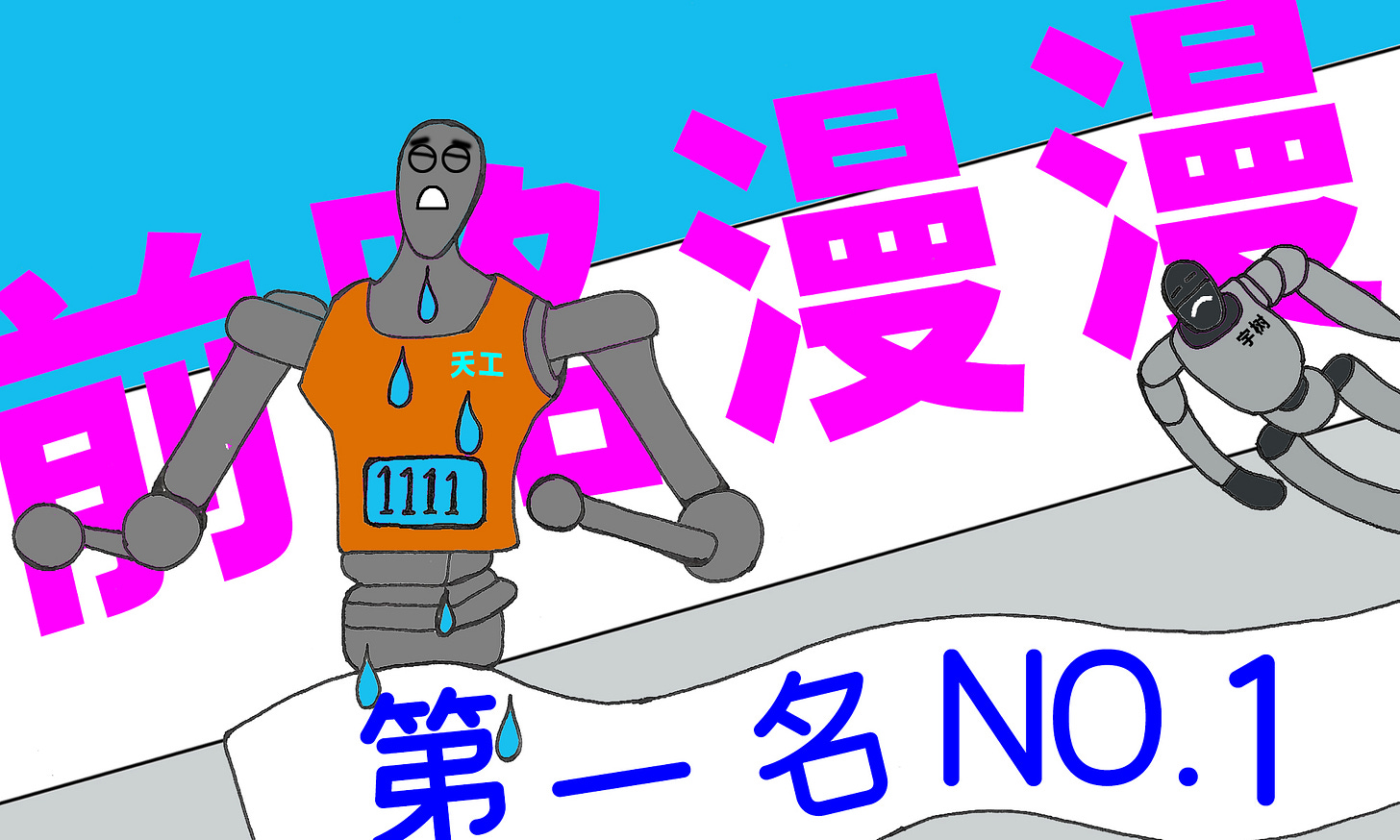"A long way to go" — Phrase of the Week
China's humanoid robots take a first step on a long journey

Our phrase of the week is: "A long way to go" (前路漫漫 qián lù màn màn)
Context
On April 19, the world's first human-robot half-marathon took place in Beijing, with 20 humanoid robots competing against 12,000 humans.
Only six made it to the finish line.
The winner, the Tiangong UItra, made it in 2 hours, 42 minutes.
But for the teams of humans who built the robots and took part in the race, this wasn't about speed, or even winning.
It was about finishing, and making progress.
Xiong Youjun (熊友军), the CEO of the winning team, explains:
Even though we still have a long way to go before humanoid robots are commercialized, the future of such robots is no longer science fiction, as the industry inches closer to key technical breakthroughs.
尽管,目前关于人形机器人的商业化问题依然前路漫漫,但随着技术临界点的日益临近,人形机器人的曙光正在到来。
Jǐnguǎn, mùqián guānyú rénxíng jīqìrén de shāngyèhuà wèntí yīrán qiánlù mànmàn, dàn suízhe jìshù línjièdiǎn de rìyì línjìn, rénxíng jīqìrén de shǔguāng zhèngzài dàolái.
And with that, we have our Sinica Phrase of the Week!
What it means
The phrase, "a long way to go" (前路漫漫 qián lù màn màn), is often translated as "the road ahead is long and uncertain."
Literally, the four characters translate as: "road ahead" (前路), and "long and boundless." (漫漫). It usually describes a future filled with uncertainty or challenge, but it also carries an undertone of persistence, and determination to keep moving forward, no matter how long or difficult the path.
Like many expressions in modern Chinese, this phrase has deep roots in classical literature. Its origin lies in a 2,000-year-old poem, The Lament (离骚 lí sāo), written by Qu Yuan 屈原, a poet and statesman from the Warring States period (circa 340–278 BCE).
The Warring States era was one of the most turbulent periods in Chinese history, marked by ongoing wars, shifting alliances, and political intrigue, as rival states competed for dominance over a fragmented China.
Qu Yuan, a loyal advisor to the State of Chu (楚国), was eventually exiled for being outspoken in his criticism of official corruption. In exile, he composed The Lament, a poetic journey through both the real world and mythological realms, expressing his sorrow, idealism, and relentless search for truth and virtue, even in the face of betrayal and isolation.
The phrase appears in what is arguably the poem’s most famous line:
"The road ahead is long and stretches far, but I will search high and low to seek the truth."
路漫漫其修远兮,吾将上下而求索。
Lù màn màn qí xiū yuǎn xī, wú jiāng shàng xià ér qiú suǒ.
Here it’s composed of three characters, "the road is long and boundless" (路漫漫). In modern Chinese, the four-character idiom, with “ahead” (前) added at the start is more common.
One of the best known English translations of The Lament comes from British sinologist David Hawkes, whose 1959 classic The Songs of the South remains the definitive English edition. Hawkes renders the line: "The road ahead is long and has no ending; yet high and low I’ll search with my will unbending."
Today, and certainly in this context, it’s often translated in a more practical, understated way: simply to say “the road ahead is long”.
China’s humanoid robots have a long way to go. But there is quiet determination to succeed among its current generation of robotics engineers.
Andrew Methven is the author of RealTime Mandarin, a resource which helps you bridge the gap to real-world fluency in Mandarin, stay informed about China, and communicate with confidence—all through weekly immersion in real news. Subscribe for free here.
Read more about how this story is being discussed in the Chinese media in this week’s RealTime Mandarin.



